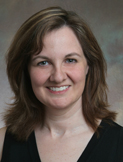
Paula Frew, PhD
The scientific part of the AIDS Vaccine 2010 meeting began Tuesday evening with an exciting summary of issues facing the field from NIAID director Tony Fauci. But before that, participants in this year’s conference got a chance to warm up with several “satellite sessions.â€
One of them, “Effective Community Engagement in HIV Vaccine Research Among Communities and Researchers,†was organized by Paula Frew, PhD, director of health communications and applied community research at Emory’s Hope Clinic.
Two prominent themes emerged from this session. The first was that community members should be involved in clinical trials at every step of the process: from design and recruitment to dissemination of results.
“In the past, scientists often came to the community late in the process, after a protocol for a study was already approved, and said: “Will you support what we’ve already decided?†said Steve Wakefield of HIV Vaccine Trials Network. “This doesn’t work.â€
The Joint United Nations Programme on HIV/AIDS and AVAC presented proposed guidelines for “good participatory practice,†analogous to good clinical practices.
Another theme that emerged from the satellite session was the search for more flexible “adaptive†clinical trial formats. Glenda Gray from South Africa’s University of the Witwatersrand emphasized that adaptive trials could be faster and avoid enrollment of large numbers of patients unnecessarily.

